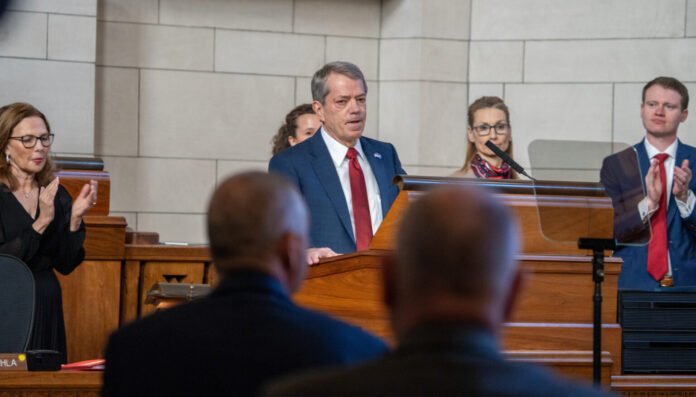A proposal to switch Nebraska’s method of awarding presidential electoral votes to a winner-take-all system was blocked Tuesday after two Republican lawmakers opposed the measure, overcoming a filibuster.
The failure of the bill ensures that the Omaha area’s “blue dot” congressional district, which has awarded its electoral vote to Democratic candidates in three of the past five presidential elections, will remain under the current system.
Senator Merv Riepe of Ralston, a Republican, honored his commitment not to support the winner-take-all proposal, despite significant pressure from Governor Jim Pillen, who urged Riepe to stand with fellow Republicans. Pillen even issued a statement on Monday urging Riepe to back the proposal, citing his previous votes in favor of changing the system. However, Riepe, whose district is closely divided between Republicans and Democrats, explained that the winner-take-all system would be detrimental to his district. “The voters in my district overwhelmingly support keeping the current system,” he said, adding that of the 135 constituents who contacted him, only nine supported the change.
Freshman Senator Dave Wordekemper, whose district covers part of the 2nd Congressional District in eastern Nebraska, also voted against the bill. He cited that 75% of the messages his office received from constituents opposed the winner-take-all proposal.
Nebraska and Maine are the only states that allocate their electoral votes by congressional district, a system both have used in recent elections. In Nebraska, the method has posed challenges for Republicans, as Democratic candidates have managed to capture one of the state’s five electoral votes in 2008, 2020, and again in 2024, despite Republicans winning the majority of the state. This has sparked ongoing efforts to change the system and adopt a winner-take-all approach, like the one used by most other states.
However, these efforts have consistently been thwarted, mainly due to Nebraska’s unique unicameral Legislature, which requires a supermajority to overcome a filibuster. Currently, Republicans hold 33 seats, the exact number needed for such a majority, but opposition from Riepe and Wordekemper killed the latest attempt.
Governor Pillen’s push for the winner-take-all system is believed to be driven by his desire to align with former President Donald Trump, who has endorsed the change. Last year, the debate intensified as both Republicans and Democrats anticipated that Nebraska’s electoral votes might play a decisive role in the presidential race. Conservative activists, fearing that Nebraska’s split vote could lead to a Democratic victory, began advocating for the change.
However, not all conservatives are on board. In a committee hearing earlier this year, a Republican Party chair from western Nebraska testified against the bill, expressing concerns that such a change could backfire in the future as the state’s rural population shrinks and Omaha continues to grow.
Pillen was also met with strong opposition at a town hall meeting in Scotts Bluff County, where residents, who overwhelmingly supported Trump in 2024, loudly rejected his call for a winner-take-all system.
With Tuesday’s vote, the current proposal has been effectively defeated for this session. Speaker of the Legislature John Arch confirmed that no further action will be taken unless the measure receives priority designation, which it has not. Another proposal that would allow voters to decide on the change in 2026 remains in committee but could be revisited in future sessions.
For more political updates, visit, DC Brief.


